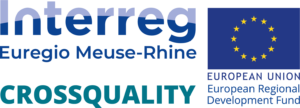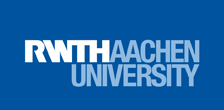Crossquality is a project supported by the Interreg-EMR Fund and the European Union. Its aim is to explore the possible qualitative indicators of the Interreg programme. As there are no qualitative indicators for the evaluation of Interreg projects yet, this project is a guideline for the whole European territory.
The total budget of the project is € 176,949.75, of which € 150,058.37 are ERDF funds.
About the research project
How good is the cooperation of public sector bodies, companies or citizens in our cross-border region? How can we describe the quality of cross-border networks and entities? And finally: what are precisely the positive effects of an Interreg programme on the different aspects of cooperation and governance across borders?
In 2021 and 2022, the Crossquality project developed a methodology to measure the quality of cross-border cooperation related to Interreg programmes. With this innovative qualitative assessment methodology, it is possible to better assess the effects of Interreg programmes in a specific programme area. One practical result of the project is a handbook for practitioners describing how to apply the assessment.
As a pilot, the team from RWTH Aachen, Hasselt University, University of Liège, Maastricht University and EGTC Euregio Meuse Rhine carried out a first assessment by approaching many Interreg experts in the cross-border territory, conducting interviews, organising workshop and launching a survey.
Activities
1. In a first step, the existing indicator system of the INTERREG programme Meuse-Rhine will be analysed to find out to what extent it already measures aspects of the quality of cross-border cooperation and where deficits are identified. Furthermore, other existing indicator, assessment or evaluation systems will be analysed with regard to the quality of cross-border cooperation. This search for already existing practices and tools will be done in contact with ESPON and the European Commission, DG Regio, and will refer to the different ESPON tools for territorial impact assessment. In this sense, the methodology will build on existing work at EU level.
2. Based on the research, a draft methodology and set of indicators will be developed with the expertise of the project partners. This work will be supported by the involvement of practitioners from the Euregio Meuse-Rhine dealing with the INTERREG programme and cross-border cooperation. In addition, external experts from other programmes or with particular expertise in territorial impact assessment will contribute to the work. The draft methodology will be discussed and tested.
3. As the main part of the project, the methodology will be applied with the help of practitioners and experts on the territory of the Euregio Meuse-Rhine by assessing the quality of cross-border cooperation and the governance system. Given the experience of previous projects, the main tools are the collection of existing data, data production through questionnaires, qualitative interviews and expert workshops. The final results will become the baseline measurement and benchmark for structured impact assessments.







